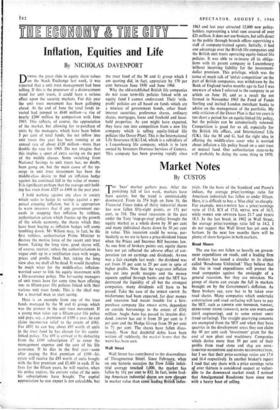Inflation, Equities and Life
rffIT'E -mann LifiN ory
By NICHQLAS DAVENPORT
DURING the great slide in equity share values on the Stock Exchange last week, it was reported that a unit trust management had been selling. If this is the precursor of a disinvestment trend for unit trusts, it could have a serious effect upon the security markets. For this year the unit trust movement has been galloping ahead. At the end of June the total funds in- vested had jumped to £640 million—a rise of nearly £200 million by comparison with June 1965. This reflects, of course, the appreciation of the market, but allowing for re-purchase of units by the managers, which have been below 5 per cent of total funds,' the net inflow into unit trusts this year has been running at an annual rate of about £120 million—more than double the rate for 1965. Do not imagine that this implies a spurt of extra saving on the part Of the middle classes. Some switching from National Savings to unit trusts has, no doubt, been going on, but the main cause of the up- surge in unit trust investment has been the middle-class desire to find an inflation hedge against the continual fall in the value of money. It is significant perhaps that the average unit hold- ing has risen from £325 to £408 in the past year.
I hold nothing against any class in society which seeks to hedge its savings against a per- petual creeping inflation, but it is appropriate to warn investors that if any government suc- ceeds in stopping that inflation by ruthless, authoritarian action which freezes up the growth Of the whole economy, the shares which they have been buying as inflation hedges will come tumbling down. Mr Wilson may, in fact, be the first ruthless, authoritarian Prime Minister to destroy the motive force of the recent unit trust boom. Taking the long view, good shares will, of course, recover, unless the authoritarianism in vogue ends up in a totalitarian state with wages, prices and profits fixed, but, taking the long view also, we shall all be dead. It would therefore be much wiser for the middle-class inflation- worried saver to link his equity investment with a life-assurance policy. The far-seeing managers of unit trusts have for some time been offering ten- to fifteen-year life policies linked with their various unit trust funds. This is the ideal way for a married man to start saving.
Here is an example from one of the trust funds managed by the M and G group, which was the pioneer in the unit trust movement. If a young man takes out a fifteen-year life policy and pays, say, a premium of £100 a year, he can claim income-tax relief to the extent of £164. For £831 he can buy about £93 worth of units in the trust fund he has chosen for his equity- linked policy. The £93 is arrived at by deducting from the £100 subscription £7 to cover the management expense and the cost of his life assurance. If he dies in the first year—soon after paying the first premium of £100—his estate will receive the f93 worth of units bought with the first premium and £1,400 in cash. If he lives for the fifteen years, he will receive, when his policy expires, the current value of the units his subscriptions have bought. The capital appreciation he can expect is not calculable, but the trust fund of the M and G group which I am quoting did, in fact, appreciate by 170 per cent between June 1956 and June 1966.
Why the old-established British life companies do not issue term-life policies linked with an equity fund I cannot understand. Their 'with- profit' policies are all based on funds which are a mixture of government bonds, other fixed- interest securities, preference shares, ordinary shares, mortgages, loans and freehold and lease- hold properties. As you might have expected, they have run into competition from a new life company which is selling equity-linked life policies (the Dover Plan). This is the International Life Insurance (UK) Ltd, which is a subsidiary of a Luxembourg life company, which is in turn owned by Investors Overseas Services of Geneva. This company has been growing rapidly since
1963 and last year attracted 12,000 new policy- holders representing a total sum assured of over £21 million. It does not use-brokers, but sells direct to the public through branch offices supervising a staff of company-trained agents. Initially, it had one advantage over the British life companies and the British unit trusts operating equity-linked life ,policies. It was able to re-insure all its obliga- tions with its parent company in Luxembourg 'without incurring liability for the investment- dollar premium. This privilege, which was the cause of much talk of 'unfair competition' on the `part of British companies, was withdrawn by the Bank of England twelve months ago (a fact I was unaware of when I referred to the company in an article on June 10, and as a result the ios formed in November 1965 the Fund of Funds Sterling and invited London merchant banks to advise on the management of the portfolio. My only criticism of the Dover Plan is that ten years is too short a period for an equity-linked life policy, but the policies can be automatically renewed. Competition is good for us all, especially for the British life offices, and International Life (UK), like the M and G, had the right idea in offering the middle-class saver who is worried about inflation a life policy based on a unit trust or mutual fund. Our authoritarian state-to-be will probably be doing the same thing in 1970.





























 Previous page
Previous page